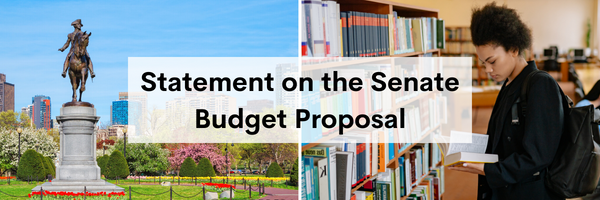
The state budget process continues on as the Senate Ways and Means Committee (SWM) released its proposal for the State budget today.
The Senate had to contend with recent news that year-to-date tax revenue collections are lower than expected, leading to hard choices about the Commonwealth’s priorities. The difficult trade-offs will become even harder if April’s revenue trend turns out to be the beginning of a deeper decline.
Though their tax proposal is still forthcoming, the Senate Ways and Means budget creates a placeholder that would allow for tax cuts of a similar size as proposed by the House for FY 2024. However, this does not commit the chamber to tax cuts that are as regressive or as costly in future years, as was proposed by the Governor and the House. Such tax breaks would exacerbate racial and economic inequality while crowding out other priorities like investments in housing, infrastructure, childcare, and tax credits for those living on low and middle-incomes.
Differences in how the Senate, House, and Gov spend Fair Share money
Compared to the House and Governor proposals, the SWM proposal would direct more Fair Share money toward municipal roads and bridges, implementation support for free community college, and community college nursing programs. The proposal includes significantly more funding for regional transit authorities, including for a six-month pilot that would eliminate bus fares on regional transit statewide. There are only three areas of full agreement on Fair Share spending among the Governor, House, and Senate Ways and Means Committee proposals: the same appropriation amounts for MassReconnect (free community college for students over 25), income-eligible childcare vouchers, and a means-tested fares pilot for the MBTA.
Some Highlights in the Senate budget
In addition to Fair Share funds, the SWM budget would take several steps toward stronger support for education. Early education funding would increase significantly, as it would in the Governor’s version and the House proposals. SWM proposes more funding than the House budget for higher education scholarships, student support services, and support for free community college programs, including a new program for students in the nursing field. The SWM budget would provide particular support to students from immigrant families, by making in-state tuition rates available to Massachusetts high school graduates who are in the process or intend to apply for permanent legal status.
Today’s budget proposes more spending on housing assistance than do the House and the Governor versions. SWM included $3.2 million in additional funding for the Alternative Housing Voucher Program (AHVP) over the FY23 budget, which provides funding for rental support for those with disabilities. Other rental assistance programs, such as MRVP and RAFT, also received more funding in the SWM budget, potentially kicking off a debate to be settled at conference committee. Unfortunately, the Senate proposes significantly less money for the Housing Assistance for Reentry Transition program than did the House, which is important because this program helps to increase racial equity in access to rental supports for those exiting incarceration.
The SWM budget also proposes expanded support for behavioral health. This includes $100 million to bolster the behavioral health workforce, including loan repayment assistance and scholarships, with a focus on underserved communities.
MassBudget will update our Budget Browser in the coming days to include numbers from the Senate Ways and Means budget proposal for all spending items. The Browser allows users to view the effect of inflation on each item, which is important because any spending item that does not keep up with inflation is effectively a cut in support. The Budget Browser also adjusts for intragovernmental transfers and tuition remission back to the Commonwealth by public colleges and universities.





